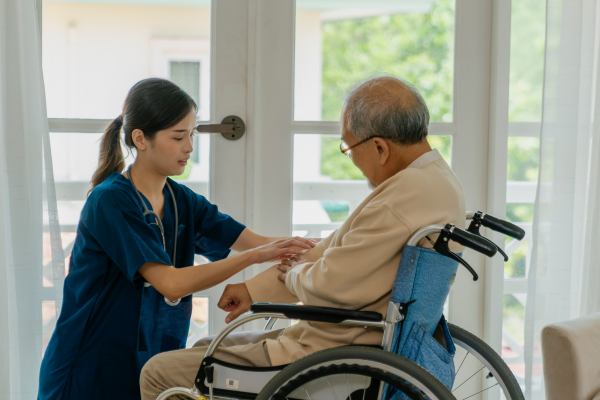How To Decide Between Inpatient and Outpatient Hospice Care
The decision to pursue hospice and palliative care is a hard choice to make, and many factors go into deciding whether inpatient or outpatient care is the right fit for your situation. The goal of hospice agencies like Wings of Hope is to give you the full breadth of information about your options and what end-of-life care would look like at home or in a facility, and hopefully help guide you to making the best decision for your needs.
Why You Should Consider Inpatient Care
It is never easy for a loved one to have to be away from home and in a facility when dealing with terminal and late-stage illnesses, but in some cases treatment in a facility is not only the best choice for the patient, but also alleviates a lot of stress and pressure on the family or caregivers. Certain circumstances and factors are best addressed in a facility if they come up, like a sudden deterioration in condition or wound care or respiratory issues that go beyond those that can be managed at home. Inpatient care is often provided in hospitals, other nursing facilities or hospice houses and are preferred in more serious cases because they allow round-the-clock observation and monitoring. While many are used to frantic and loud hospital settings, hospice care facilities are calmer and are designed to feel as much like home as they can. Staff are freer to take their time with patients and the patient’s family, answering questions and giving guidance, and visitors are welcome day and night — with overnight arrangements also being possible.
If your loved one requires more detailed attention than you or an in-home hospice worker can provide, don’t be discouraged from seeking inpatient options. Inpatient hospice team members often work quickly to get a patient’s symptoms under control, usually in a matter of days, and so stays in facilities are usually short and hopefully rare. The goal is ultimately for a patient to be comfortable and because many people are most comfortable at home, getting someone stable and ready to return home from inpatient care is a priority.
When Outpatient Care Is Best
Home is a safe haven for people, especially when dealing with illness or uncertain times, and patients seeking hospice or palliative care are no different. Being at home is often soothing, as patients are surrounded by belongings and memories they have collected, as well as pets and other loved ones. Routines are very important for those dealing with end-of-life scenarios and being in familiar surroundings around familiar faces does a lot in helping patients keep to a routine. Most of the time hospice care is given at home, and it is the goal of many hospice organizations to help the patient stay comfortable at home and not have to go into an inpatient facility unless absolutely necessary.
A plan for outpatient care is an important first step in providing hospice care at home, and the hospice team you work with considers a lot of different factors in designing a plan for your needs. The patient and the patient’s loved ones are at the center of the team and the plan, and it is helpful to remember that when hospice care members do start working in your home, they are there as a support and help, not to take over. The hospice team will coordinate with the patient’s doctors and assess medication and other medical needs the patient might have. Medical equipment like motorized beds or breathing machines will be delivered to the home soon after hospice care is started, as will medications.
Members of the hospice team, like chaplains and social workers, are available to provide spiritual or emotional support, and members of the hospice team will make regularly scheduled visits.
Respite Care and Other Options
Caring for those who are terminally ill can often be just as hard as managing the illnesses themselves, and caregivers in particular benefit greatly from as much pressure being taken off them as possible. With a lot of uncertainty surrounding death and patients requiring escalated levels of assistance, caregivers often need a break—which is why respite care is a good middle-ground between inpatient and outpatient care. Caregivers can get a break as patients can spend a few days and nights in a designated nursing home or facility. This break ensures caregivers don’t burnout or negatively impact their own health, as often you are so busy caring for someone else you often don’t realize the toll it is taking on you until it is too late. After the days are up, patients can return home and caregivers are then better able to resume their responsibilities now that their own needs have been met. And respite care is also available for shorter durations — if only a smaller break is necessary, like if a caregiver wants to run errands or meet a friend, a hospice team member or other trusted person is able to fill in.
Making decisions about hospice care for a loved one can be difficult and trying, but it is also important to assess whether inpatient or outpatient care is necessary, with the ultimate goal of in-home care where people are most comfortable. End-of-life decisions can weigh heavily on you and your loved ones, but it is best to remember that the decision to pursue hospice may not be just what is best for the patient, but for the patient’s loved ones and caregivers as well.
Wings of Hope specializes in hospice and palliative care, and we strive to provide hope and light to families in what is inevitably a dark time. We are available 24/7 to provide the support and information you need when navigating end-of-life decisions. The decision to pursue hospice or palliative care is never an easy one, and we are here so you don’t have to walk through it alone.





